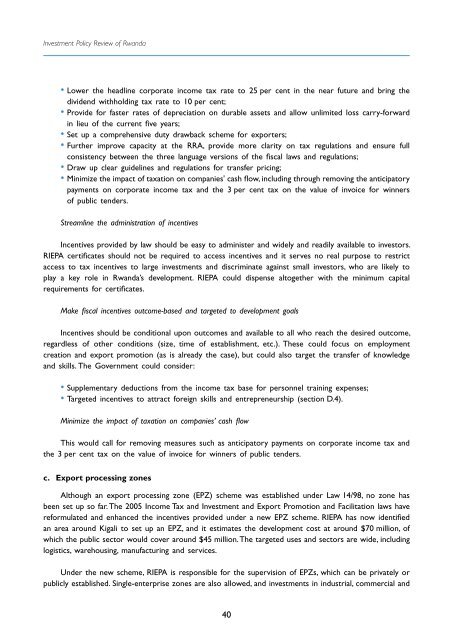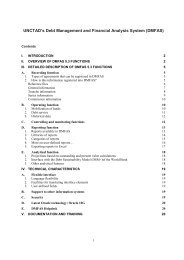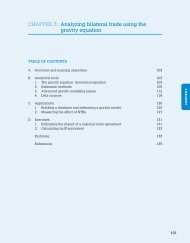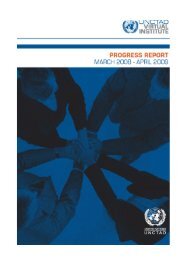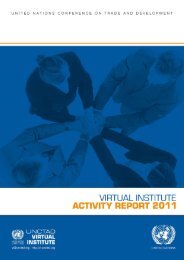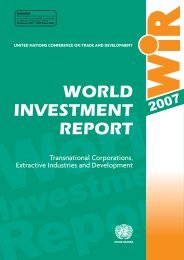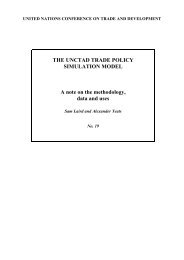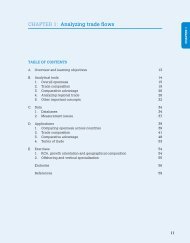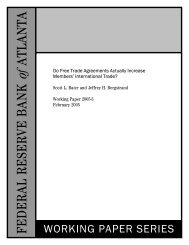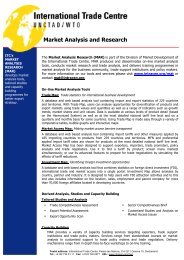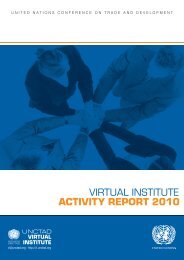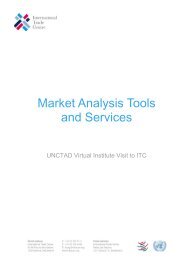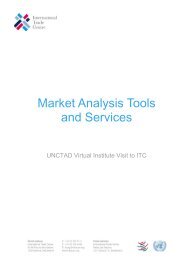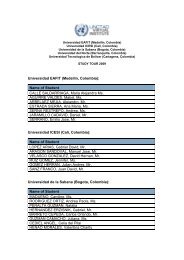Investment Policy Review - Rwanda - UNCTAD Virtual Institute
Investment Policy Review - Rwanda - UNCTAD Virtual Institute
Investment Policy Review - Rwanda - UNCTAD Virtual Institute
Create successful ePaper yourself
Turn your PDF publications into a flip-book with our unique Google optimized e-Paper software.
<strong>Investment</strong> <strong>Policy</strong> <strong>Review</strong> of <strong>Rwanda</strong><br />
•<br />
Lower the headline corporate income tax rate to 25 per cent in the near future and bring the<br />
dividend withholding tax rate to 10 per cent;<br />
Provide for faster rates of depreciation on durable assets and allow unlimited loss carry-forward<br />
in lieu of the current five years;<br />
Set up a comprehensive duty drawback scheme for exporters;<br />
Further improve capacity at the RRA, provide more clarity on tax regulations and ensure full<br />
consistency between the three language versions of the fiscal laws and regulations;<br />
Draw up clear guidelines and regulations for transfer pricing;<br />
Minimize the impact of taxation on companies' cash flow, including through removing the anticipatory<br />
payments on corporate income tax and the 3 per cent tax on the value of invoice for winners<br />
of public tenders.<br />
•<br />
•<br />
•<br />
•<br />
•<br />
Streamline the administration of incentives<br />
Incentives provided by law should be easy to administer and widely and readily available to investors.<br />
RIEPA certificates should not be required to access incentives and it serves no real purpose to restrict<br />
access to tax incentives to large investments and discriminate against small investors, who are likely to<br />
play a key role in <strong>Rwanda</strong>’s development. RIEPA could dispense altogether with the minimum capital<br />
requirements for certificates.<br />
Make fiscal incentives outcome-based and targeted to development goals<br />
Incentives should be conditional upon outcomes and available to all who reach the desired outcome,<br />
regardless of other conditions (size, time of establishment, etc.). These could focus on employment<br />
creation and export promotion (as is already the case), but could also target the transfer of knowledge<br />
and skills. The Government could consider:<br />
•<br />
•<br />
Supplementary deductions from the income tax base for personnel training expenses;<br />
Targeted incentives to attract foreign skills and entrepreneurship (section D.4).<br />
Minimize the impact of taxation on companies’ cash flow<br />
This would call for removing measures such as anticipatory payments on corporate income tax and<br />
the 3 per cent tax on the value of invoice for winners of public tenders.<br />
c. Export processing zones<br />
Although an export processing zone (EPZ) scheme was established under Law 14/98, no zone has<br />
been set up so far. The 2005 Income Tax and <strong>Investment</strong> and Export Promotion and Facilitation laws have<br />
reformulated and enhanced the incentives provided under a new EPZ scheme. RIEPA has now identified<br />
an area around Kigali to set up an EPZ, and it estimates the development cost at around $70 million, of<br />
which the public sector would cover around $45 million. The targeted uses and sectors are wide, including<br />
logistics, warehousing, manufacturing and services.<br />
Under the new scheme, RIEPA is responsible for the supervision of EPZs, which can be privately or<br />
publicly established. Single-enterprise zones are also allowed, and investments in industrial, commercial and<br />
40


